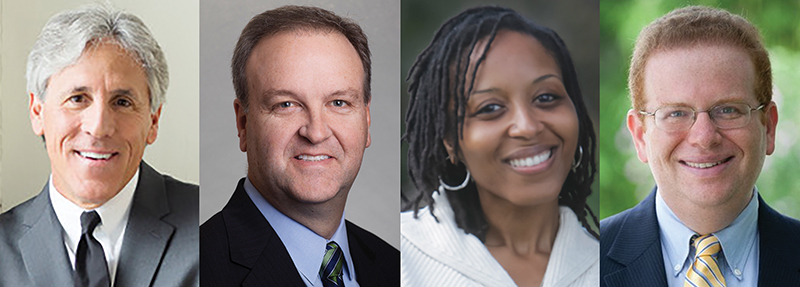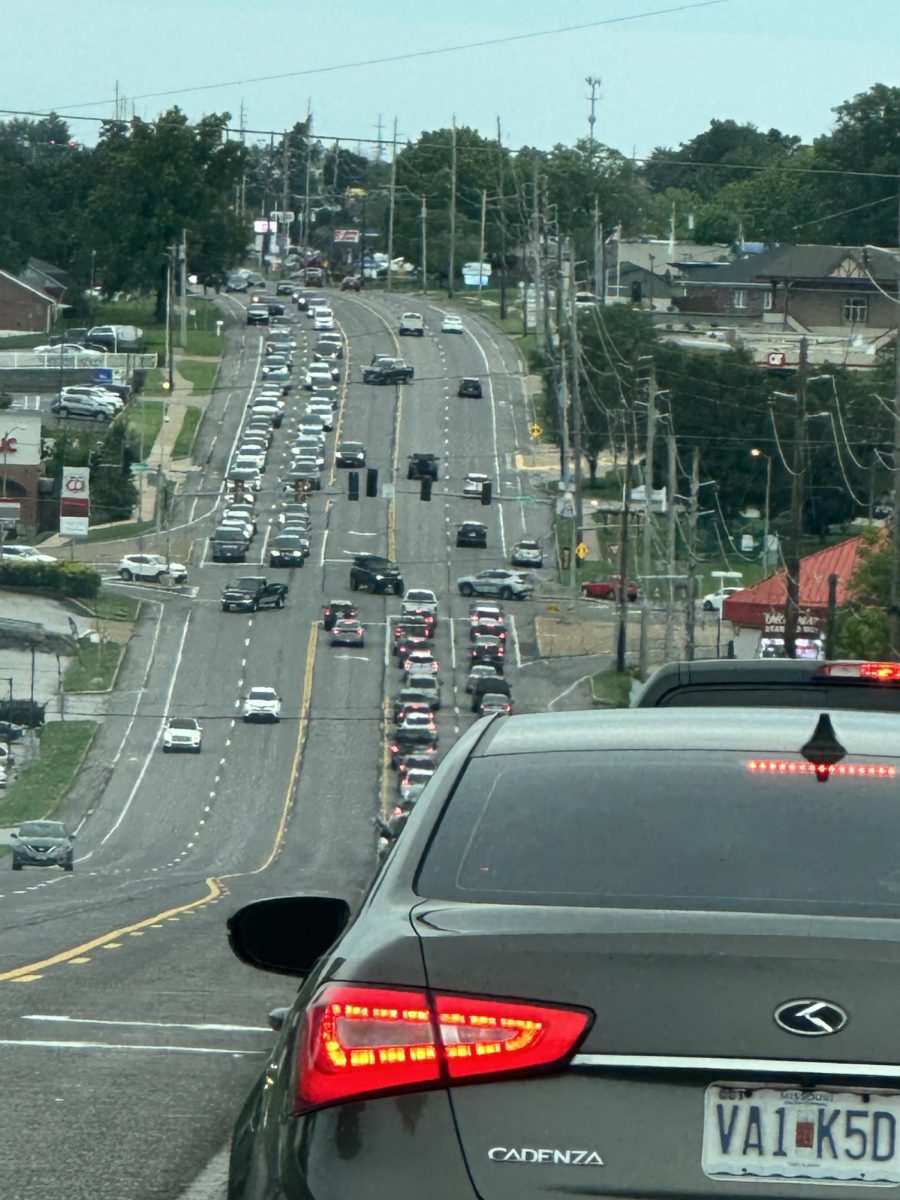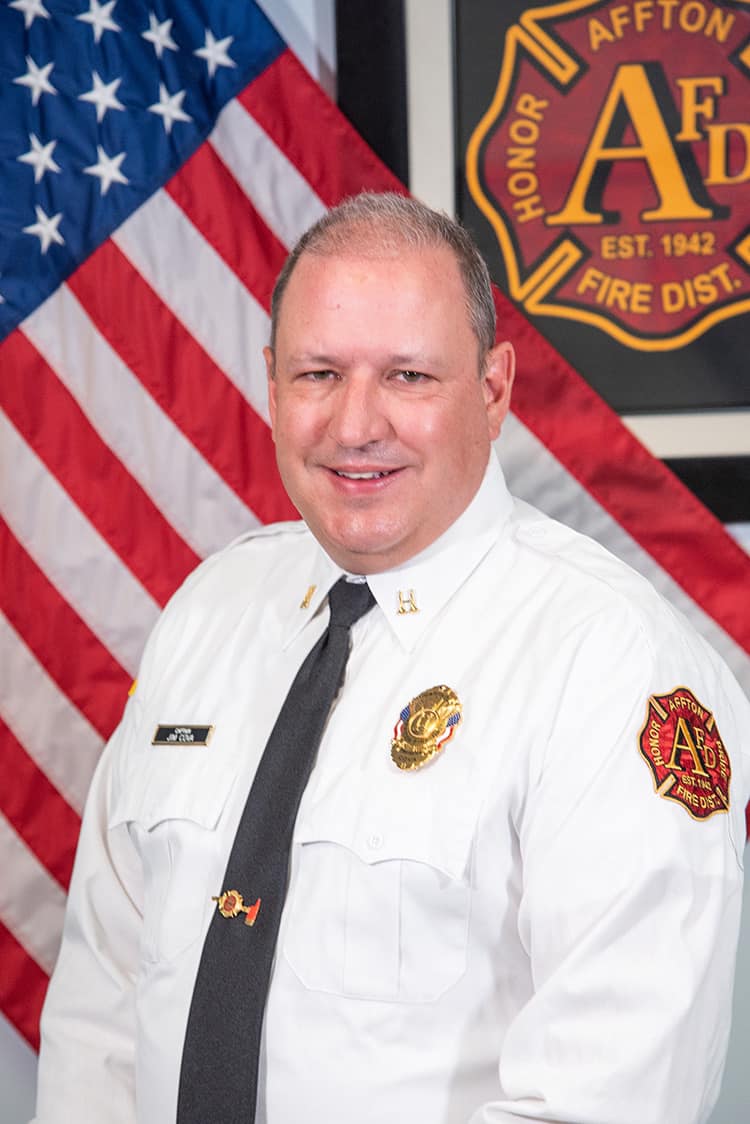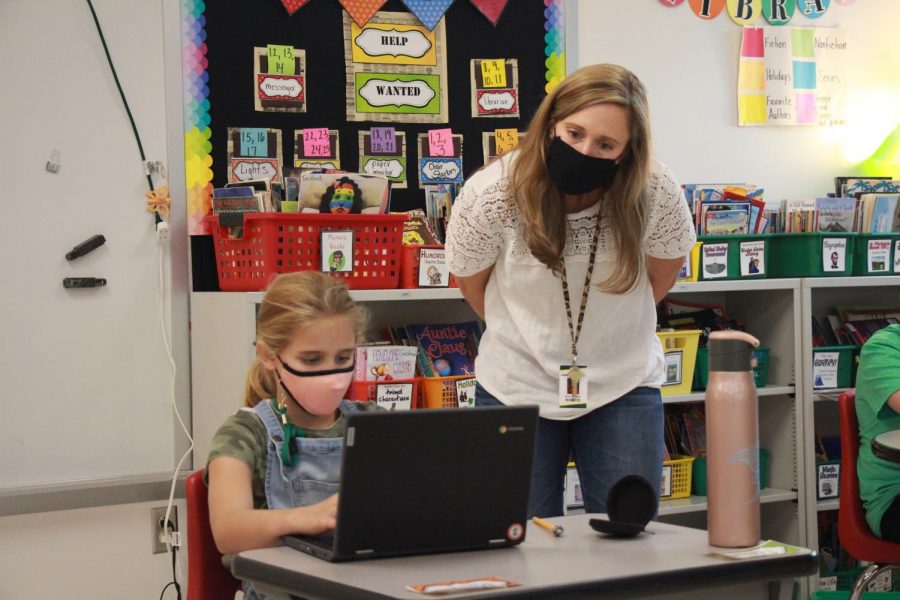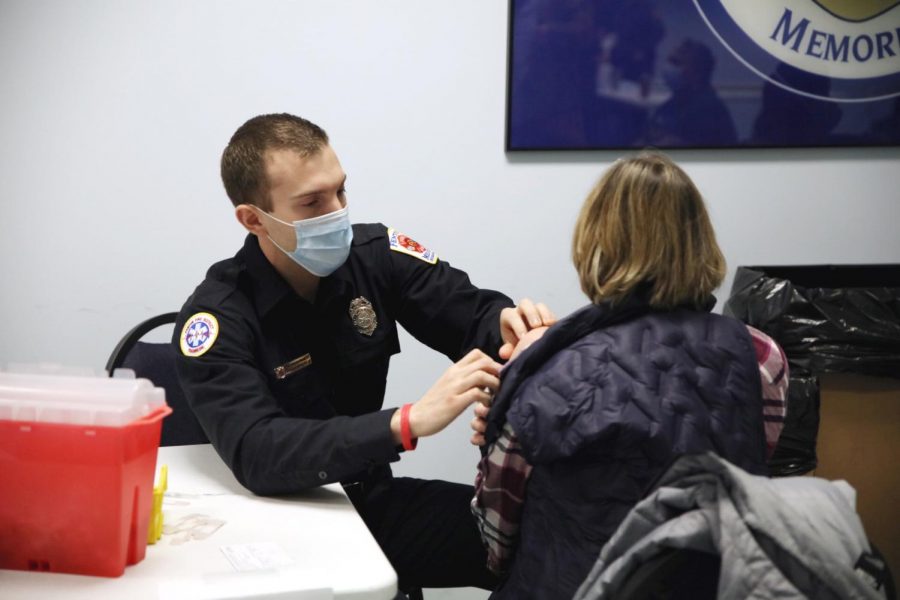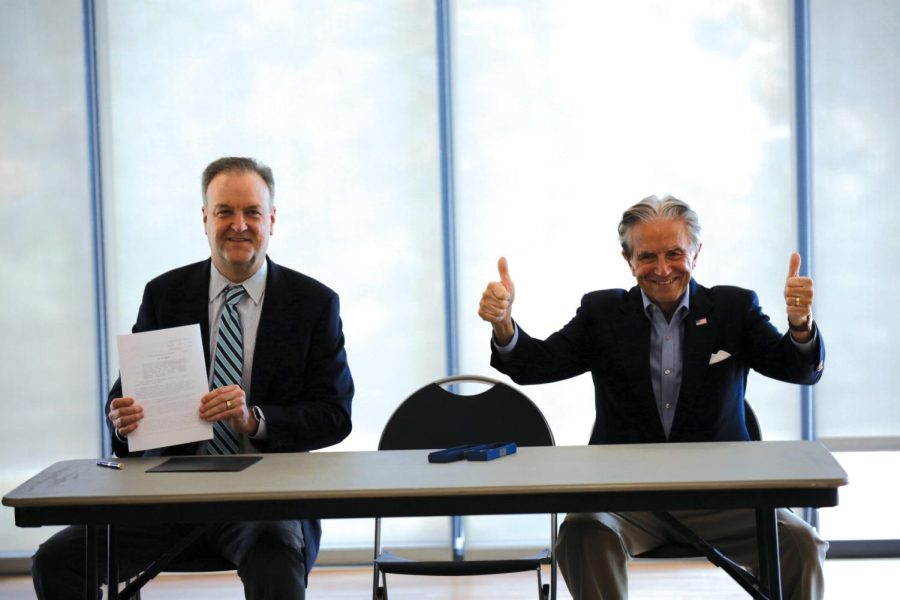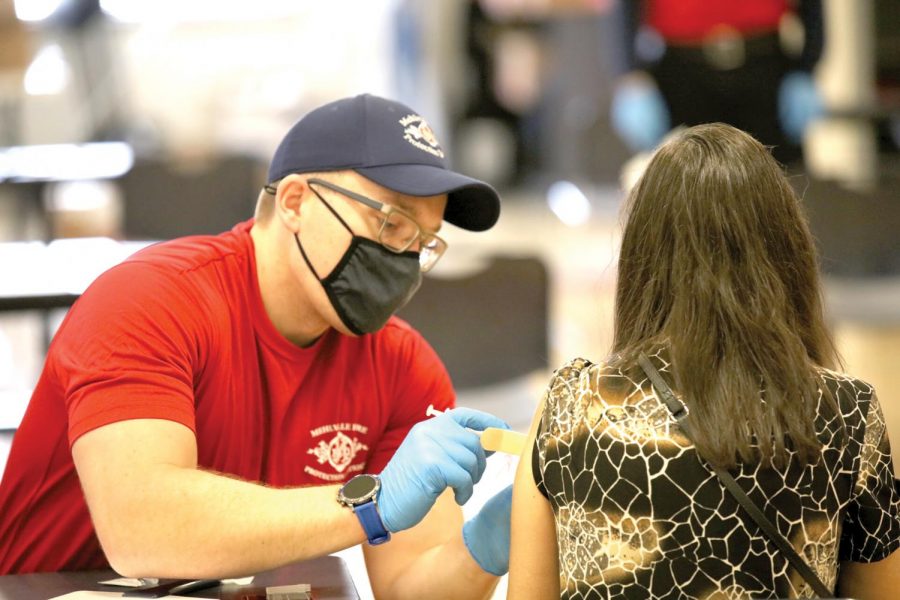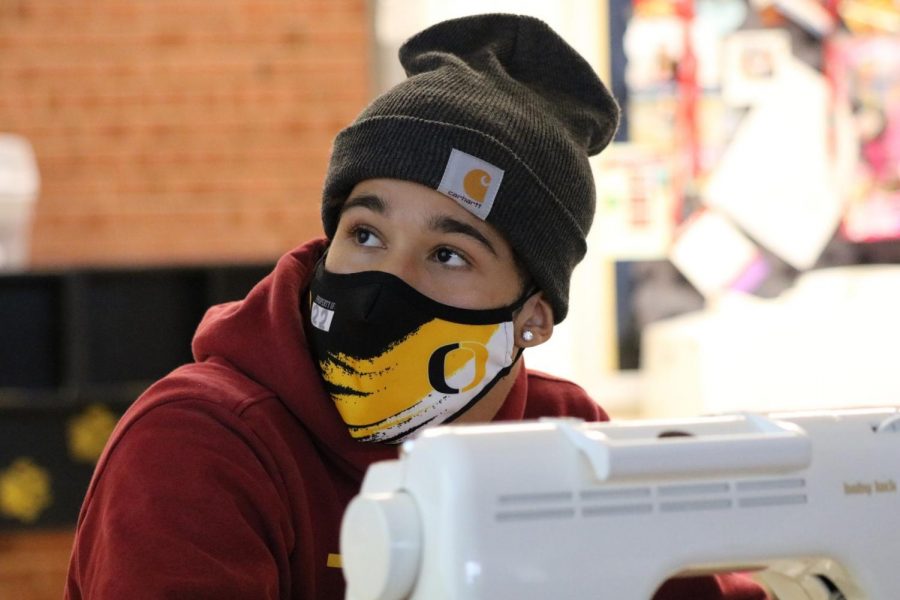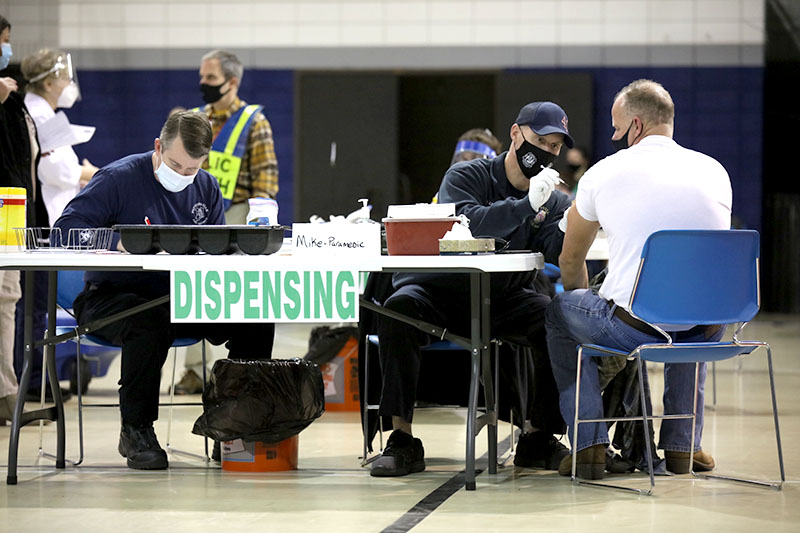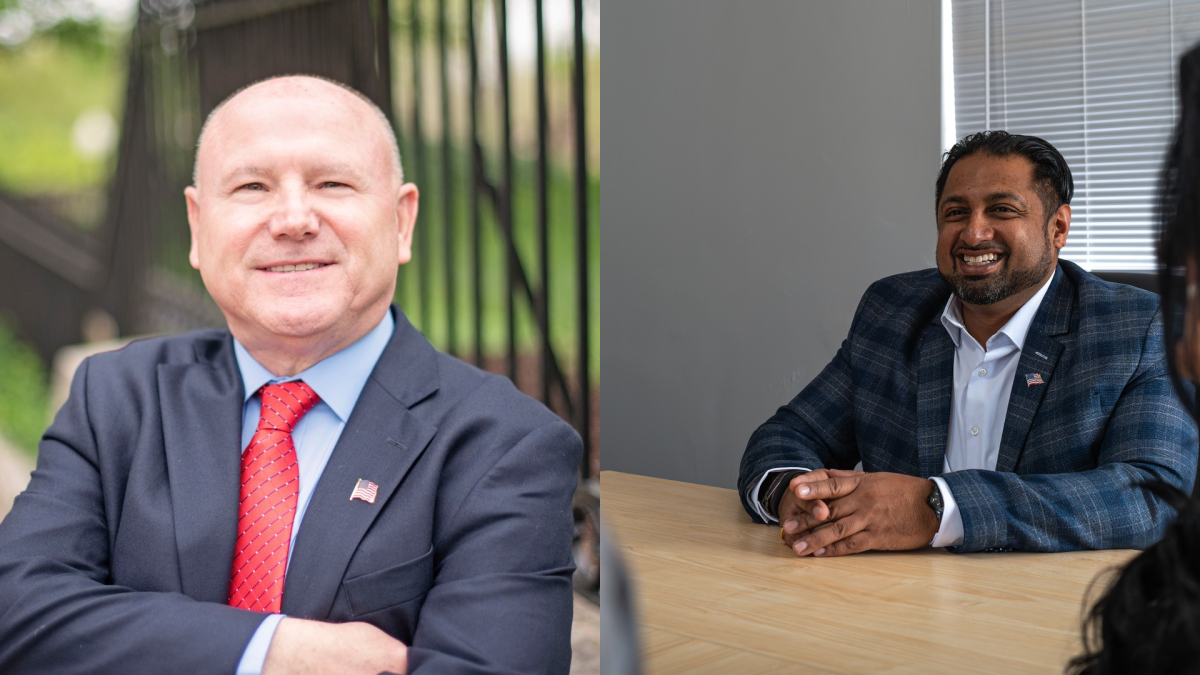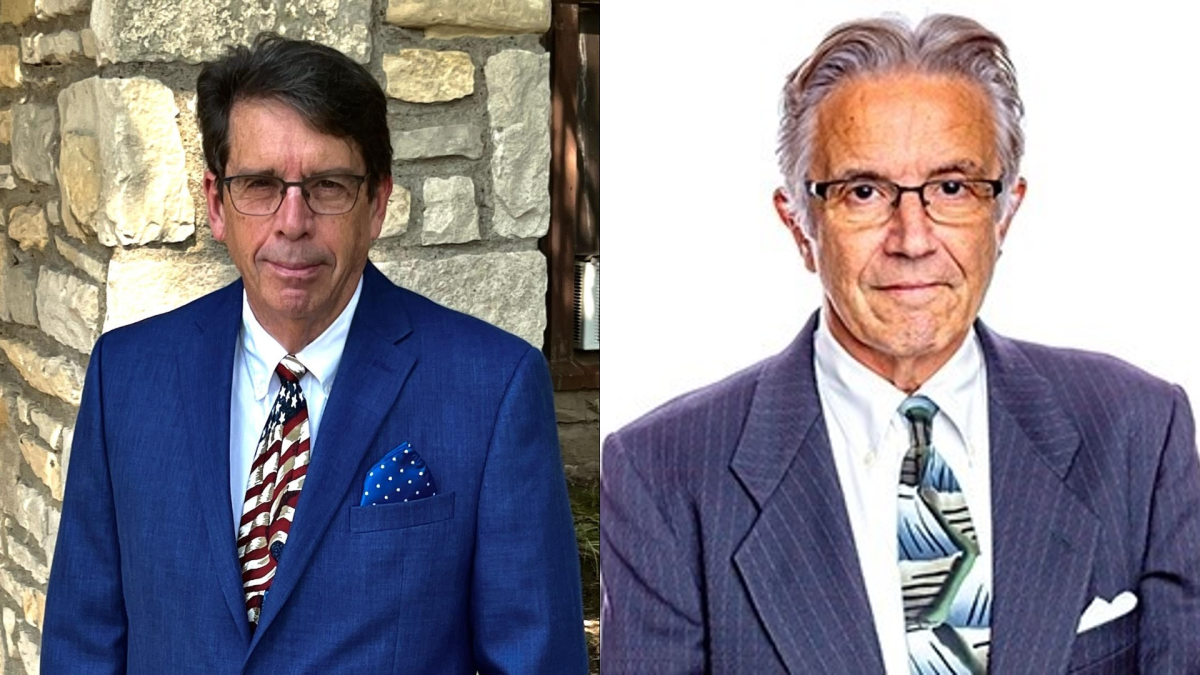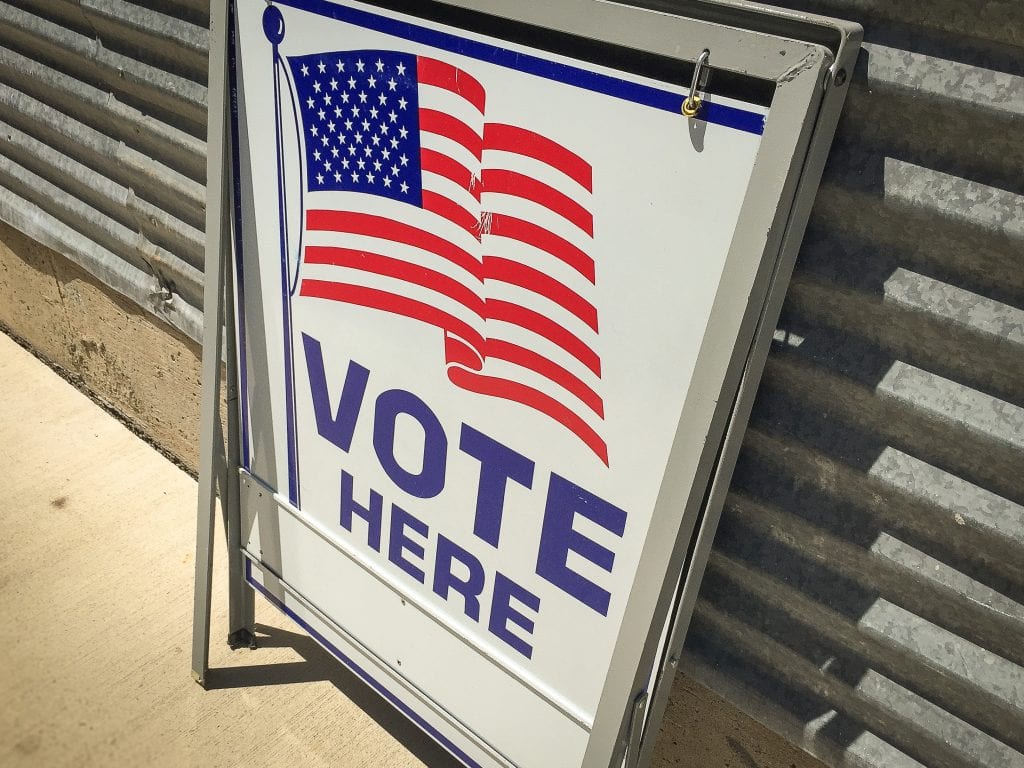A debate for the Democratic candidates in the St. Louis County executive race Wednesday night centered around the county’s response to the coronavirus and issues surrounding education, which traditionally hasn’t been a topic for the county executive.
Incumbent County Executive Sam Page of Creve Coeur, businessman Mark Mantovani of Ladue, University City resident Jamie Tolliver and county Assessor Jake Zimmerman of Olivette answered questions for an hour in the socially distanced debate, which was organized by St. Louis Public Radio, KSDK Channel 5 and the Nine Network. Questions were asked by St. Louis Public Radio’s Jason Rosenbaum and KSDK’s Casey Nolen, and the debate was moderated by the Nine Network’s Ruth Ezell.
The winner of the Aug. 4 Democratic primary will face the winner of the Republican race, Ed Golterman or Paul Berry III, in November. But with St. Louis County increasingly leaning Democratic, the winner of the November race will most likely be decided in the August Democratic primary. Satellite voting locations are open now.
With no live studio audience due to COVID and spaced 10-12 feet apart from each other with Plexiglas shields in between, the four candidates answered questions for an hour on COVID-19, crime, economic development, a city-county merger, educational topics that have never typically been part of campaigns for county executive in the past and even Stan Kroenke and the NFL.
With cases of COVID-19 reaching the highest daily totals yet for St. Louis County the day of the debate, the first questions centered around what actions the candidates would take to combat the virus.
Page, a physician and former County Council chairman who was appointed as county executive by the council in May 2019 after the resignation of then-County Executive Steve Stenger due to federal corruption charges that sent Stenger to prison, said he has done what he had to do in the last six months of the coronavirus pandemic to keep St. Louis Countians safe. He issued one of the first stay-at-home orders in the country.
“The No. 1 duty of the county executive is to look out for the health and welfare of everyone in St. Louis County,” Page said, adding that his response all along has been “cautious and thoughtful,” with capacity at businesses still held at 50 percent.
“We have to be prepared to issue further orders, further restrictions on social distancing and gatherings if we cannot get universal mask wearing adopted in our community — that’s why I issued a mask mandate two weeks ago,” Page said. “We’re working very diligently to get that adopted… We really would like to see mask mandates in our neighboring counties as well because there’s so much movement back and forth.”
But Mantovani, Tolliver and Zimmerman each took issue with the steps Page has taken to combat the coronavirus.
Although the “most important thing” is to follow the advice and guidelines from the Centers for Disease Control, including social distancing and personal hygiene, Mantovani said, he felt that the full stay-at-home orders — which extended for nearly two months — were too devastating to the county’s economy to be repeated.
“In terms of closing, I think we have to think of this in terms of a dimmer switch instead of an on-off switch,” in consultation with the county Department of Public Health about the “kinds of efforts that need to be made to keep businesses operating if they can safely for customers and their employees,” on a case-by-case basis, Mantovani said.
“The county executive has operated his decision making like Moses — he descends from the mountain and tells people the way it is and then he’s frustrated that people don’t abide by his direction,” Mantovani later said. “That’s authoritative, it’s dictatorial, it’s not collaborative, and that’s the biggest flaw with respect to the way we as a community have approached this situation.”
Tolliver said she “absolutely agreed” that the universal mask mandate Page issued July 3 was a necessary step. But she felt the county should cooperate more with businesses, which could be open for fewer hours so that fewer people would be out and about.
“The masks are great, but staying at home is often better,” Tolliver said, later adding, “You don’t have to shut it down, but if staying at home is safer, it would be safer if the businesses were not open for people to go to, if we made them more aware of the risks involved both for themselves and their patrons.”
Zimmerman said he was disappointed by the “lack of regional cooperation” in the stay-at-home orders, which sometimes differed from what the city of St. Louis had issued. He also criticized Page’s move last week to re-impose limits on youth sports due to rising cases, which some youth sports advocates are contending wasn’t backed by data. He called for “a little more science and a little less politics” in decision making.
“I think about the time St. Louis city opened its parks at the same time St. Louis County was closing its parks yet leaving adult bookstores open, and I really worry about that lack of regional coordination,” Zimmerman said. “Unfortunately I see it happening again — there was reporting just in the last few days that inaccurate information about youth sports was shared with the public and you have pediatricians saying they were left out of discussions when they could have added an important voice. To have a situation as these virus cases rise where we’re saying kids can’t play softball but it’s OK to have bars open, it strikes me that something is wrong.”
Mantovani also called the city-county cooperation on COVID-19 “abysmal,” and linked it to a lack of cooperation with mayors of municipalities and with parents and coaches of youth sports.
But Page said that in the county’s 14-page stay-at-home order, there was only one difference, what he called a “footnote,” between the county and the city — bars were kept open in the city while they were closed in the county. Overall, the response has been “incredible and unprecedented cooperation between the city and the county,” he said.
As for what to do about crime, an issue also in the news that day because of a shooting at The Galleria mall in Richmond Heights, Zimmerman said that a “little more leadership” is needed to address rising numbers in the county and region.
“When you think about the scourge of gun violence, it is high time that the leadership in this community stood up and said ‘not another dead kid in the street.’ It is high time that we stop playing footsie with Republican leadership in Jefferson City — these are the people trying to shove things down our throat like guns in our schools, guns in our synagogues and other places of worship, and it is high time that all of us in this region stand up to the senseless violence,” said Zimmerman. “Whether it happens at The Galleria or whether it’s the kind of tragedies that happen every day in less affluent areas of the community, it is time to stand up and say it is not OK.”
Mantovani said, “Nobody in this community has proposed an effective crime mitigation program in the last 10 years” and proposed initiatives that have been done in Boston and Oakland. “We have got to get a handle on the violent crime in this community — every poll of St. Louis County residents indicates it’s one of their primary concerns and to ignore this is unacceptable.”
Asked directly whether they would appoint a new police board for the St. Louis County Police Department with the intent of replacing new Chief Mary Barton, who took office in April but upset members of the County Council in June that she didn’t see racism in the department, Page pledged to work with her even though he disagrees with her assessment on systemic racism.
“I disagree with her assessment on systemic racism, we all know that systemic racism exists in our country, it exists in our community, it exists in all of our institutions,” Page said. Referring to Stenger, he said, “We did have a previous county executive who worked very hard to tell his appointees exactly what to do, and that didn’t work very well for him and now he’s in prison.”
He also noted the top-to-bottom review of the department that is being privately funded by Civic Progress, a group of the CEOs of the largest companies in the area.
Mantovani, who has been endorsed by the police union, said he hadn’t yet met Barton and had no opinion on whether she should stay, redirecting the question back to crime.
Tolliver suggested that people should be able to vote on a police chief, rather than have one appointed for them.
“Systemic racism is a thing, it has been a thing for hundreds of years in this state, and I think the people should have more say so in how they are protected,” Tolliver said.
But Zimmerman, who has made reforming the Police Department a central part of his campaign, said none of that is enough.
“Let’s just say what needs to be said — it’s not acceptable to have a St. Louis County police chief who denies that racism is a real thing. This is not a time for dancing around with words, this is a which-side-are-you-on moment,” Zimmerman said. “I get that Sam wants to have it both ways here, he handpicked this police board to handpick this police chief and then she embarrassed him. but leadership requires you to take a stand. What leadership is not about is burying your head in the sand and pretending that problems don’t exist … What we don’t need right now is another study. What we don’t need is outside experts to tell us what we ought already know in our hearts.
“What we ought to know is that racism is real, in the Police Department and everywhere else in this community, and what we ought to commit ourselves to for the sake of our kids and everyone, whether they live north or south of that Delmar divide, is to work tirelessly to eradicate it and to have no patience for anybody who claims that the problem isn’t real.”
Page responded, “We have to understand that the police board does pick the police chief.
We can pretend otherwise, we can make grandiose statements that the county executive has to make tough decisions … I don’t always get everything that I want, I don’t get everything that I like, but I am not going to try to to control the decisions of people I appoint who are qualified to make those decisions. … I will work with whoever is police chief, I will give Chief Barton a chance to understand the challenges in our community.”
On economic development, a question revolved around statements earlier this month from Centene CEO Michael Neidorff, whose company is headquartered in Clayton but just started an East Coast headquarters in Charlotte, North Carolina. He warned that if St. Louis doesn’t fix crime and the MetroLink, more companies would take their jobs elsewhere.
Zimmerman said “it’s a wakeup call with real circumstances: Thousands of jobs that should be going here are going to North Carolina.”
“This shouldn’t have been a wakeup call, if it woke Jake up then he was already sleeping because I’ve been saying this stuff for two or three years,” Mantovani said, echoing Neidorff’s concern that St. Louis is falling behind and has to focus more on regional economic development. “If you’re the chief executive of an enterprise and you’re not out selling on behalf of your enterprise you’re not doing your job, and I have never once heard the county executive or Mr. Zimmerman for that manner communicate any interest or ability to how we’re going to grow this region. We can’t solve our challenges, social or otherwise, if we don’t tackle our economic development.”
Page said that the root of “all of our complex problems in this region” is systemic racism, with some areas left behind. He suggested focusing on the areas where St. Louis excels, including bioscience, life science and geospatial technology.
Mantovani said that GDP in St. Louis is much lower than Minneapolis or Pittsburgh and added, “To suggest that our economic base is doing fine shows total ignorance. If you believe Mr. Neidorff, if you believe the NFL, if you believe Amazon … we are hurting in this respect and naming a few industries that we’ve had a bit of success on is not a solution to the problem.”
Zimmerman jumped in, “I don’t believe the NFL, I don’t believe the terrible things that Stan Kroenke said about this region as he kicked us in the rear end on his way out the door. But those of us who want to act in good faith rather than cater to the desires of a handful of billionaires should understand that if we work together with a little less political sniping and a little bit more vision for what we could be, then maybe we’ll get something done.”
Mantovani called Zimmerman the “king of sniping”: “He’s criticized the police, the police chief, the state government, developers, the NFL — Jake is the king of sniping, Jake throws bombs at everybody all day long. I’m trying to build bridges across this community, and he’s just criticizing everybody else and every side of this issue.”
Possibly referencing Mantovani’s past donations to Republicans, Zimmerman said, “You know, I’ve been a Democrat for longer than some folks on this stage and I think back to the words of Missouri’s greatest Democratic leader, Harry Truman, when they called him ‘Give ‘Em Hell Harry’ and he just smiled and said, ‘I don’t give ‘em hell, I just tell the truth and sometimes they think it’s hell.’”
Asked to give a yes-or-no answer to whether they support a city-county merger through a statewide vote, Mantovani and Page said no and Zimmerman said “hell no.” Tolliver said yes.
All four candidates said they would be willing to support a vote by St. Louis County to expand the Special School District to cover the school district for the city of St. Louis, St. Louis Public Schools.
But while education has never really been a purview of the county executive’s office, Page has worked with school districts this summer to figure out how to return to school during the pandemic and whether that should be in school buildings or virtual.
Zimmerman said his son will start kindergarten this fall, “and like a lot of parents in this town, dear God, I hope he can start kindergarten. But what I want for him I have to balance against what I want for everyone in this community and protecting the safety of all of our neighbors, and I have to think about the teachers and I have to think about the essential employees and the people who are called upon to sweep the floors in that school building when the day is done. And it’s unacceptable to me to privilege my child’s educational needs over the broader safety of everyone. … Whatever the answer is, it must be driven by science, not politics.”
Page again emphasized that the No. 1 priority of the county executive has to be the health and safety of residents, which includes children, teachers and their families.
“Kids who fall behind in school can miss a lifetime of opportunity, but first we have to keep them safe,” Page said, noting that he’s encouraged any family that can to choose the virtual school options that districts are offering.
“If COVID-19 continues on its current trajectory, if we cannot get everyone in the community wearing masks, social distancing and abiding by our crowd restrictions, then there’s no way schools can open with anything but virtual,” Page said. “But we have to keep our kids learning, we can’t let them fall behind, and then we have to address the equity issue, this goes back to our understanding of systemic racism,” with a “digital divide in St. Louis County” that prevents access to virtual learning by some students.
To bridge that gap, Page referenced the county spending some of its federal coronavirus response funds on tablets and internet hotspots so that all children can connect to their schools.
Mantovani said he hoped that the decision would be a collaborative one among teachers, superintendents, parents, the health department and county officials “instead of playing Moses again and somebody saying ‘Thou shalt do this.’ I don’t think that’s right, and I think that’s why our community is struggling with the regulations that have come out of the county health department, because there’s been no sense of collaboration.”
Tolliver recommended consulting with homeschooling parents to see how they are managing with school at home. She also recommended a return to textbooks as a way to fix the problem that not every child has access to the internet.
“It is really hard to say we’re going to go virtual in a world where not everyone has access to virtual. Getting behind on your education will absolutely set you behind in life,” she said. “… I think that we should get back to the basics in a lot of ways because we do not know how this virus is going to end, we don’t know when it’s going to end and we should prepare for all circumstances and all scenarios.”

















